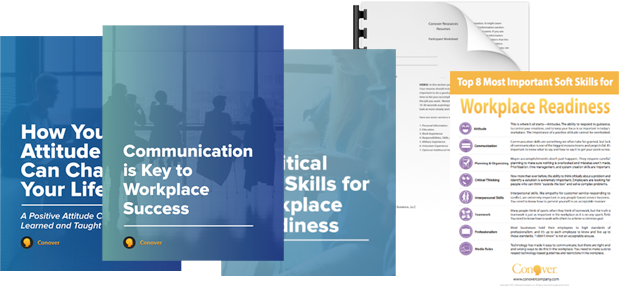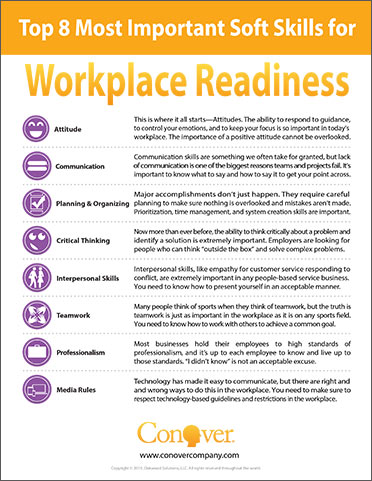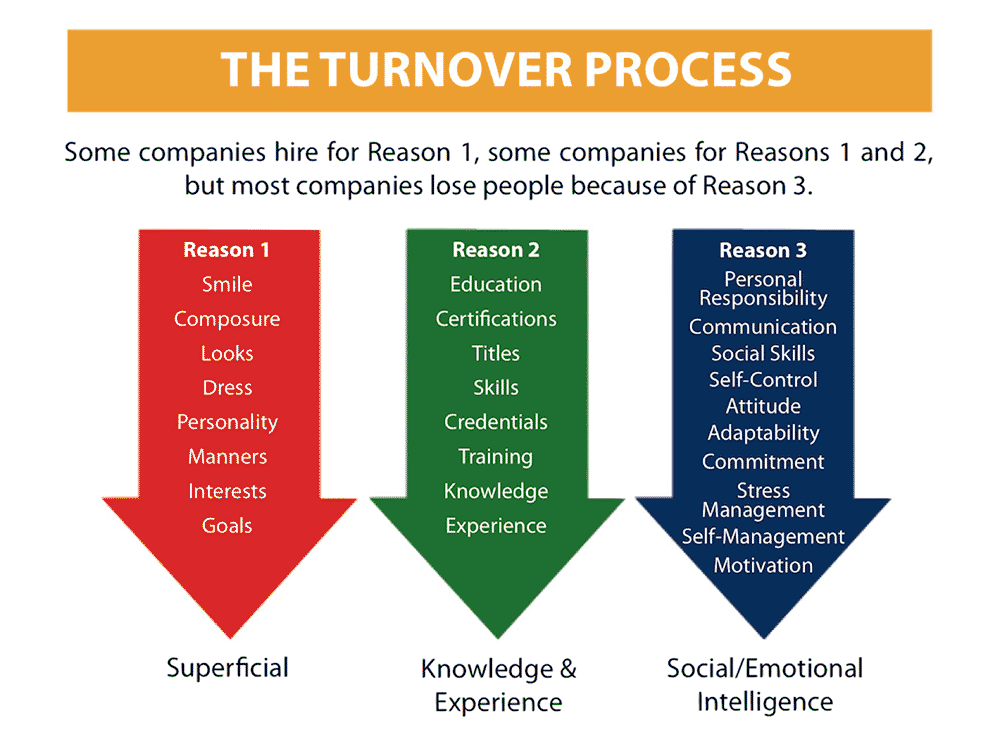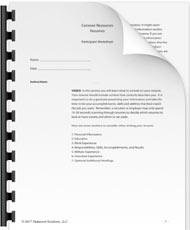Want your group to be successful...?
Soft Skills Training – The New Standard
Soft skills (or social/emotional learning, emotional intelligence, etc.) are quickly becoming the new yardstick for measuring success, and with good reason. Research shows that these soft skills account for as much as 85% of an individual’s success, whereas traditional “hard skills” (academics, corporate job training, IQ, etc.) only account for 15%.
Let me say that again: “hard skills” only account for 15% of success in life
Employers have placed a premium on employees’ ability to communicate, to think critically and solve difficult problems, to learn new skills, to lead others, to function independently, to work as part of a team to accomplish a common goal, and to accept and thrive with constant change. This can be accomplished with soft skills training.
But these skills are not typically taught in colleges and universities. And yet these are the skills that employers are clamoring for in today’s workplace. They are also the skills that can make or break a company or organization.
What Are Soft Skills?
In a digital world where technology allows people to be more closely linked than ever before, soft skills are the traits that allow us to reach out and connect with others and be our best selves. Much like emotional intelligence, which is the capacity to express our own emotions and respond to the emotions of those around us, soft skills drive and define personal skills and interpersonal growth. So, what are soft skills and why are they important? Some soft skills examples include having a positive attitude, effective time management, and empathy. The counterpart to soft skills are, of course, hard skills. What is the difference between soft and hard skills? Examples of hard skills include math, writing, and competency in software. Hard skills like this are easily measured and categorized, but soft skills are a bit more complex. They are more fluid rather than concrete, and are transferable to a variety of settings, including the workplace.
Soft Skills List – Soft Skills Training Topics
While having a general understanding of soft and hard skills is important, specificity is required to set goals and make changes. Here are some key soft skills that employers are looking for in today’s workforce:
Attitude
- The Importance of Having a Positive Attitude
- Keeping Your Focus
- Doing Your Best
- Responding to Guidance or Direction
- Controlling Your Emotions
- Being Flexible
Your attitude determines what level you are going to live your life at. Just ask Tasha, whose attitude allowed her to overcome an accident that paralyzed her from the chest down.
Download the free “Power of a Positive Attitude” ebook below.
Communication
- Listening
- Verbal Communication
- Nonverbal Communication
- Emotional Awareness
- Written Communication
- Communicating in Difficult Situations

Planning & Organizing
- Prioritizing
- Time Management
- Coordinating Resources
- Delegating
- Create Systems
- Planning Ahead
Critical Thinking
- Gathering Information
- Analyzing Information
- Applying Information
- Forming Hypothesis
- Problem Solving
- Decision Making
Interpersonal/Soft Skills
- Interpersonal Skills
- Controlling Your Emotions
- Socializing at Work
- Networking
- Responding to Conflict
- Helping Customers
Teamwork
- Respecting Others
- Active Listening
- Demonstrating Reliability
- Participating
- Communicating
- Solving Problems
Professionalism
- Workplace Rules and Expectations
- Personal Responsibility
- Workplace Ethics
- Physical Appearance
- Language
- Minding Your Manners
Media Rules
- Cell Phone Rules
- Email Rules
- Laptop and Tablet Rules
- Video Conferencing Rules
- Internet Rules
- Internet Safety
- Social Media Use
Soft Skills for Education and Students
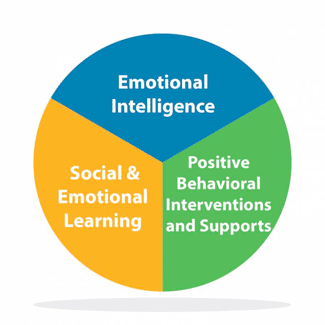

Emotional intelligence is the term used worldwide when referring to social and emotional learning and development. Emotional intelligence is a learned ability to identify, experience, understand, and express human emotions in healthy and productive ways. Emotional intelligence skills are primary factors of motivation and the gateway to lifelong learning and high levels of achievement. Emotional experience and expression are unique to each person. No two people think, feel, and act in exactly the same way. Both soft skills and Emotional Intelligence are vital when it comes to building strong communities and transformative classrooms. Students who choose empathy over judgement, assertion over aggression, and curiosity over closed-mindedness help cultivate an environment in which learning thrives and bullying is eradicated. In addition to cultivating engaged students and valued employees, soft skills are integral to adapting to one’s circumstances. In the face of enormous challenges, having a strong set of soft skills takes the impossible and makes it possible. While Emotional Intelligence is a learned ability requiring a systematic, experienced- based approach to assessment and learning, many educational institutions do not provide a practical and systematic model to assess and learn emotional intelligence skills. Learning emotional knowledge and skills requires an intentional, active, learner- centered assessment and skill intervention process as well as a period self-directed coaching, mentoring and visualization.
“A leader’s intelligence has to have a strong emotional component. He has to have high levels of self-awareness, maturity and self-control. She must be able to withstand heat, handle setbacks and, when those lucky moments arise, enjoy success with equal parts joy and humility. No doubt emotional intelligence is more rare than book smarts, but my experience says it is actually more important in the making of a leader.
You just can’t ignore it.”
Soft Skills In the Workplace
Conover’s Workplace Readiness program is the culmination of almost 40 years of research and development in the area of job readiness, combined with the latest advantages of cloud-based technology. It is an assessment and skill-building system which identified the areas of greatest need and delivers targeted instruction to help develop key soft skills areas for both personal and professional success. Improving soft skills in the workplace is integral to achieving success. Our soft skills training courses will give your program participants a leg up in preparing for, seeking and securing the career of their choice. The Workplace Readiness system is recognized by the National Soft Skills Association as an effective tool for soft skills testing and intervention, and helps alleviate the typical turnover process present in most organizations.
“I divide everyone into one of two categories:
- Those that have their own energy source (those with batteries)
- Those that are dependent on others for their energy (those without batteries)
I am willing to help people without batteries, but I am not willing to hire them. I want everyone in my organization to have their own battery pack.”
7 Tips for Resume Writing
Download the Soft Skills Resume worksheet to go with this video below.
7 Interpersonal & Social Skills for the Workplace
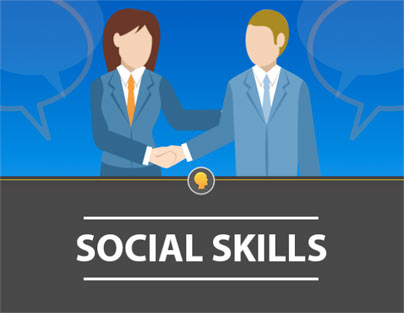
- Managing relationships
- Understanding the feelings of others
- Cooperating with others
- Great Attitude
- Showing respect
- Appropriate contact
- Active Listening
Managing Relationships
You spend a lot of time with the people at your workplace. If you are a full-time employee, you can expect to spend 40 or more hours a week with your coworkers. You can begin to understand why it is so important to have good relationships with your coworkers and managers! Good relationships will help you get along well with people and help you to do your job better.
Have a difficult coworker or manager? Always remain polite and professional towards that person. If you need to confront that person make sure you do it thoughtfully. You never know! A difficult coworker could become a good friend and a powerful ally over time.
Understanding the Feelings of Others
The ability to understand and relate to the feelings of others is called empathy. Having empathy will help you develop strong relationships with other people. When you have empathy, people feel that you understand them and how they feel.
When people tell you about something important, it shows they feel comfortable around you. Do your best to put yourself in their shoes. Think about how you would want to be treated if you were in their position. What would you want someone to say to you? What would you hope someone would do for you?
Southwest Airlines is known for hiring extremely dedicated people. They specifically look for a skill they call the “servant’s heart” – the ability to put others first, treat everyone with respect and proactively serve customers.
Cooperating with Others
Cooperating, or working well with others, is an important part of interpersonal skills in the workplace. Even though each employee might have his or her own individual tasks and goals, the entire staff or team has the same goal. That goal is to help the company be successful. Without cooperation, the workplace can be an unpleasant place, and the company will not succeed.
Before starting on a group project or collaborating, make sure each person understands what is expected of them. Ensure each person is able to share his or her ideas or thoughts. Encourage your group to be a safe space for sharing and collaborating.
Having a Great Attitude
Having an overall positive attitude will affect many aspects of your work. A great attitude will help you cope with pressure and stress as well as help you be more flexible in your job. Always sharing a positive attitude will help you grow in your position and ultimately help you move forward in your career.
You can improve your attitude and succeed at work by:
- Avoid negative thinking and complaining
- Spend time with people who have a positive attitude
- Be thankful for your job
- Give yourself a chance to recharge
- Reward yourself for doing a good job
Showing Respect
When you show respect for others in the workplace, people will show respect for you. You can show respect for others by being polite and using your manners. Always remember to say please and thank you.
When people are talking to you, listen to what they are saying and make eye contact to show that you are listening. Wait until other people have finished talking before you respond so that you don’t cause them to forget what they wanted to say.
Appropriate Contact
Interpersonal skills are not just about the things you say at work, they also include your actions, or the things you do. The way you act toward people at work will determine whether or not they feel comfortable around you. Start by always standing an appropriate distance away from the person with whom you are talking.
A good rule of thumb is to stand an arm’s length away from the person. That way, other people can easily hear you but will not feel like you are in their personal space. Some people don’t like to be touched, so it is important that you respect people’s personal space. Besides a simple pat on the back or handshake, it is best not to touch people in the workplace. Keeping your hands to yourself will ensure that you don’t offend or upset others.
Active Listening
Active listening means you are fully engaged while listening to someone talk. You’re completely focused on the person speaking. You are giving them eye contact, nodding, and occasionally asking clarifying questions to make sure you understand.
Next time a coworker or manager is speaking to you. Put your phone, computer, or notebook down and fully engaged. You’ll be surprised how much better you understand what they’re telling you and how much better you’ll remember later.
Soft Skills Training eBook
How did a man born in the woods of Kentucky with less than 18 months of formal education become one of America’s most beloved presidents? Abraham Lincoln is renowned as an incredible leader. Strategic, thoughtful, and just, he led the United States through its most difficult era. Lincoln had the strategy, technique, and experience to lead this country through its Civil War. His success can be attributed to his incredible array of soft skills. To learn more about how the world’s greatest leaders, athletes, writers, and innovators succeeded using soft skills, download the ebook here:
Resources
Ready to dive in? Here you can find a collection of Conover’s resources, including soft skill assessments, soft skills worksheets, and improving networking through soft skills. As well as soft skill training videos, real world examples of soft skills in the world, soft skills and hard skills pdf, and other various activities for soft skill and hard skill development.
